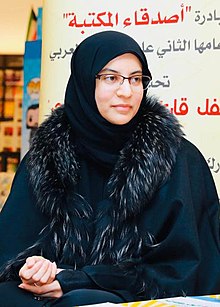Hayat Alyaqout
Hayat Alyaqout | |
|---|---|
 Hayat Alyaqout. | |
| Native name | حياة الياقوت |
| Born | 1981 (age 42–43) |
| Occupation | Writer and publisher |
| Language | Modern Standard Arabic |
| Nationality | Kuwaiti |
| Alma mater | Kuwait University |
Hayat Alyaqout (Arabic: حياة الياقوت; born 1981) is a Kuwaiti writer and publisher. She founded Nashiri, considered the first Arabic nonprofit online publishing house, in 2003.
Biography[edit]
Hayal Alyaqout was born in 1981 in Kuwait.[1][2] She obtained a bachelor's degree in political science and English from Kuwait University.[3] Alyaqout subsequently graduated with a master's degree in library and information science from the university in 2003,[3] and she has worked as a teaching associate in the information science department.[4]
A freelance writer, Alyaqout began producing articles and stories for Arabic-language publications when she was 17.[3][5][6]
In 2003, she founded Nashiri, considered the first Arabic-language nonprofit digital publishing house.[5][7][8] It is also described as the first online publishing house in the Persian Gulf.[6] The platform offers free e-book editing and publication for amateur writers.[7] It eventually gained mainstream recognition, receiving multiple awards from the Kuwaiti government,[7] including Salem Al-Ali Al-Sabah's Internet Contest Award in 2005.[8] In addition to serving as Nashiri's editor in chief,[3][9] Alyaqout has published her own work on the site, including the 2011 story "wa-tas alunī Ribikkā an al-waliyy" ("And Rebecca Asks me about the Wali").[6]
After the success of Nashiri, in 2005, Alyaqout founded the digital magazine I-MAG (short for Islamic Magazine. She led the site as editor in chief until it ceased publication in 2008.[1][3][10]
In addition to short stories, Alyaqout has written several novels, the first of which was published in 2011.[1] She has served on the board of directors of the Kuwaiti Writers Association,[1] and she has also worked with the Arab Internet Writers' Union.[11]
Alyaqout is a proponent of the Arabic language, and submissions to Nashiri must be in Modern Standard Arabic and meet certain moral standards.[7][9] She has also expressed support for government censorship in the name of protecting the youth.[12]
Publications[edit]
- Khashoom! A children's story about plastic surgeries. Also translated into English under the title Schnozi!. 2021. Alrubaian Publishing. [13]
- Ya Nisaa Jadilin (Oh Women, Argue). Essays on women's rights. 2019. That Alsalasil Publications.
- Asfaar Dinar (Dinar's Travels). Children’s Story. 2018. Kuwait Awqaf Public Foundation.
- Nutaf. Very Short Stories. 2017. That Alsalasil Publications.
- Afar. Novel. 2016.
- Ghabat Alteen (Mud Forest). Short Stories. 2015. That Alsalasil Publications.
- Kallulu (Like Pearls) . Novel. 2012.
- Alhuroof Takhruj Min Albayt (Letters Get Out of the House). Children's Book. 2012. Wahj Alhayat Publishing.
- Kalamasataan. A series of 4 short stories for children. 2011. Wahj Alhayat Publishing.
- Alice Fi Bilaad Alwaqwaq! Riwayah Laysat Lissighaar (Alice in Waqwaqland! A novel not for children). 2011.
- Man Tha Allathi Qaddada Albayaan? (Who Tore The Eloquence? Photographed Linguistic Mistakes and Sins). 2006.
References[edit]
- ^ a b c d "الكاتب: حياة الياقوت". Nashiri (in Arabic). Retrieved 2021-06-29.
- ^ "الياقوت، حياة،". Kuwait National Library (in Arabic). Retrieved 2021-06-29.
- ^ a b c d e "About I-MAG". I-MAG. 2004-12-31. Retrieved 2021-06-29.
- ^ Abdullahi, Ismail (2017-11-07). Global Library and Information Science. Walter de Gruyter GmbH & Co KG. ISBN 978-3-11-041316-8.
- ^ a b Lenze, Nele (2018-05-14). Politics and Digital Literature in the Middle East: Perspectives on Online Text and Context. Springer. ISBN 978-3-319-76816-8.
- ^ a b c Lenze, Nele (2012). "Telling stories online in the Gulf: Prolegomena to the study of an emerging form of Arabic literary expression" (PDF). University of Oslo.
- ^ a b c d Pepe, Teresa (2019-01-03). Blogging from Egypt: Digital Literature, 2005-2016. Edinburgh University Press. ISBN 978-1-4744-3401-0.
- ^ a b Lenz, Nele (May 2016). "Short Stories and Interaction in Literature Online in the Gulf". Babylon Nordic Journal of Middle East Studies.
- ^ a b Al-Shuaibi, Athoob (2015-11-14). "Arabic vs English: Mother tongue threatened by language globalization". Kuwait Times. Retrieved 2021-06-29.
- ^ "I-MAG PDF Issues". I-MAG. Retrieved 2021-06-29.
- ^ Morsi, Eman Shaban (November 2005). "ARABICLITERATURE2.0: Union and website for Internet writers provide publishing opportunity and highlight new genre". Cairo Magazine.
- ^ Kennedy, Rachael (2018-11-28). "Kuwaiti artist designs 'Cemetery of Banned Books'". Euronews. Retrieved 2021-06-29.
- ^ "Schnozi by Hayat Alyaqout". Retrieved 6 June 2022.
